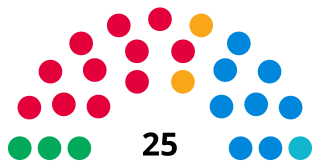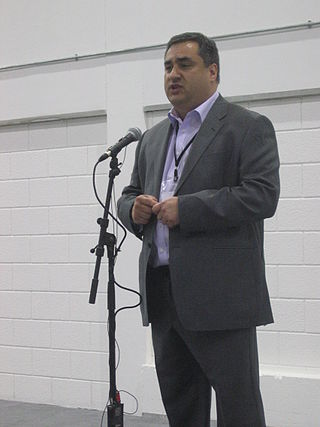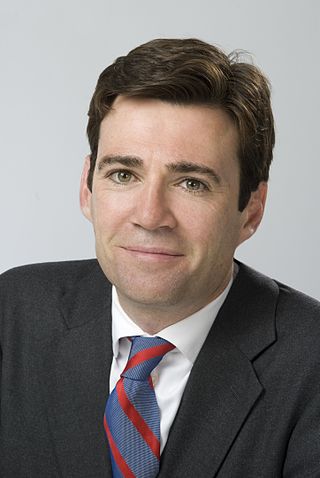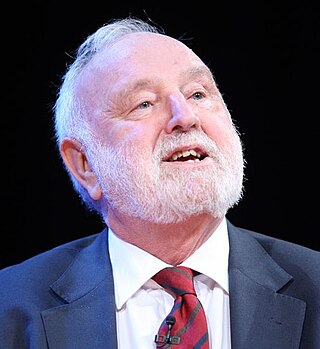
The mayor of London is the chief executive of the Greater London Authority. The role was created in 2000 after the Greater London devolution referendum in 1998, and was the first directly elected mayor in the United Kingdom.

The Greater London Authority (GLA), colloquially known by the metonym City Hall, is the devolved regional governance body of Greater London, England. It consists of two political branches: an executive Mayor and the 25-member London Assembly, which serves as a means of checks and balances on the Mayor. Since May 2016, both branches have been under the control of the London Labour Party. The authority was established in 2000, following a local referendum, and derives most of its powers from the Greater London Authority Act 1999 and the Greater London Authority Act 2007.

The Greater London Council (GLC) was the top-tier local government administrative body for Greater London from 1965 to 1986. It replaced the earlier London County Council (LCC) which had covered a much smaller area. The GLC was dissolved in 1986 by the Local Government Act 1985 and its powers were devolved to the London boroughs and other entities. A new administrative body, known as the Greater London Authority (GLA), was established in 2000.

The London Assembly is a 25-member elected body, part of the Greater London Authority, that scrutinises the activities of the Mayor of London and has the power, with a two-thirds supermajority, to amend the Mayor's annual budget and to reject the Mayor's draft statutory strategies. The London Assembly was established in 2000. It is also able to investigate other issues of importance to Londoners, publish its findings and recommendations, and make proposals to the Mayor.

The 2000 London mayoral election was held on 4 May 2000 to elect the Mayor of London. It was the first election to the office established that year; the idea of a mayor of a Greater London Authority (GLA) had been included in Labour's 1997 election manifesto, and after their election a referendum in London was scheduled for May 1998, in which there was a 72% yes vote with a 34% turnout.

In the United Kingdom (UK), each of the electoral areas or divisions called constituencies elects one member to the House of Commons.

In various parliamentary systems, a returning officer is responsible for overseeing elections in one or more constituencies.

The 2008 London mayoral election for the office of Mayor of London, England, was held on 1 May 2008. Conservative candidate Boris Johnson defeated incumbent Labour Mayor Ken Livingstone. It was the third London mayoral election, the previous elections being the first election in May 2000 and the second election in June 2004.
The Left List, later renamed the Left Alternative, was a political party active in the United Kingdom between 2008 and 2010. A minor party, it never had any of its candidates elected at any level of UK government although it inherited several local councillors who had defected to it from the Respect Party.

The London mayoral election for the office of mayor of London takes place every four years. The first election was held in May 2000, and five subsequent elections have taken place. The latest mayoral election took place in 2024.

There are five types of elections in the United Kingdom: elections to the House of Commons of the United Kingdom, elections to devolved parliaments and assemblies, local elections, mayoral elections, and police and crime commissioner elections. Within each of those categories, there may also be by-elections. Elections are held on Election Day, which is conventionally a Thursday, and under the provisions of the Dissolution and Calling of Parliament Act 2022 the timing of general elections can be held at the discretion of the prime minister during any five-year period. All other types of elections are held after fixed periods, though early elections to the devolved assemblies and parliaments can occur in certain situations. The five electoral systems used are: the single member plurality system (first-past-the-post), the multi-member plurality, the single transferable vote, the additional member system, and the supplementary vote.
Citizens UK is a grassroots alliance of local communities working together in England and Wales.

The London Assembly election of 2012 was an election of members to the London Assembly which took place on Thursday, 3 May 2012, the same day as the 2012 London mayoral election, and the 2012 United Kingdom local elections. Although Conservative candidate Boris Johnson won the Mayoral election, the Assembly election produced the Labour Party's best result since the inception of the London Assembly; this was subsequently surpassed by the party's performance in the 2016 election.

The Central Electoral Commission of Armenia (CEC) organizes elections and referendums in Armenia. The Commission oversees and regulates the electoral process, counts and publicizes results, among other duties. Before the formation of the Republic of Armenia in 1991, the Central Electoral Committee activities were carried out in accordance with Soviet Armenian laws set by the Election of People's Deputies. Electoral reforms were adopted in August 2011 concerning the organizing and conducting of presidential and regional elections in Armenia, three levels of electoral committees were established.

The inaugural Greater Manchester mayoral election was held on 4 May 2017 to elect the Mayor of Greater Manchester. The next successive election was due to be held on 7 May 2020, but due to that year's outbreak of the novel Coronavirus, the election was postponed until May 2021. Subsequent elections are legislatively required to be held every four years thereafter. The electoral system used for the election is the supplementary vote (SV).

The 2017 United Kingdom local elections were held on Thursday 4 May 2017. Local elections were held across Great Britain, with elections to 35 English local authorities and all councils in Scotland and Wales.

The London Labour Party mayoral selection of 2000 was the process by which the Labour Party selected its candidate for Mayor of London, to stand in the 2000 mayoral election. Frank Dobson, MP for Holborn and St. Pancras, was selected to stand, defeating former Leader of the Greater London Council Ken Livingstone and Glenda Jackson, MP for Hampstead and Highgate.

The 2021 United Kingdom local elections were held on Thursday 6 May 2021. More than 145 English local councils, around 5,000 councillor seats, thirteen directly elected mayors in England, and 39 police and crime commissioners in England and Wales were contested. On the same day, the 2021 Hartlepool by-election took place, and there were also elections to the Scottish Parliament, Senedd and London Assembly, the last in conjunction with the London mayoral election.

The 2022 Ealing London Borough Council election took place on 5 May 2022, under new election boundaries, which increased the number of Ealing London Borough Council councillors to 70. The elections took place alongside local elections in the other London boroughs and elections to local authorities across the United Kingdom.
















